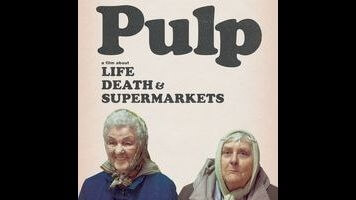Pulp is less a documentary and more a love letter to Sheffield

For a band that sings so much about sex, Pulp’s songs are littered with references to disused factories, dirty supermarkets, and other images of Sheffield, its industrial hometown in the north of England. Pulp formed in 1978 but didn’t become famous until the mid-’90s, giving its members more than a decade to find their sound. As former Pulp guitarist Richard Hawley says, those 12-some years gave the band more time than most: “Some marriages don’t last that long. Governments don’t last that long.” Hawley is interviewed in Florian Habicht’s new documentary, Pulp: A Film About Life, Death And Supermarkets, which was a joint project with frontman Jarvis Cocker—and that shows, for both better and worse. Habicht never dives too deeply or casts his net too widely, but as a filmic love letter to Sheffield, the resulting doc is full of small delights for serious Pulp fans.
Habicht goes out of his way to find beauty in Sheffield in establishing shots that emphasize the symmetry of brutal architecture and fallow buildings. Those deliberate, lingering glances mimic a lover’s gaze, and if the viewer never really understands what’s behind the personal connection between Jarvis Cocker and Sheffield, it’s at least clear that Pulp feels indebted to the city that birthed it. This point is perhaps driven home a little too strongly—as in a shot of Cocker changing a tire in front of an old mid-rise apartment building, as though he’s just any old bloke—and it lacks any real emotional context. What was Sheffield like in the ’70s and ’80s? How did that inform Cocker’s musical coming of age? How did Pulp’s manufactured, polished, sex-soaked sound come out of this industrial city?
None of that is really the point, though, as the documentary ostensibly leads up to the December 8, 2012, Pulp concert in Sheffield, the last of its U.K. reunion tour. More an expansive concert doc than a probing documentary, the film mostly seems to be trying to capture that one day, though the timeline is not always clear, as Habicht seems to interview half of Sheffield to find an older person who claims genuine love for the band. (He does succeed, though only after finding an elderly man who declares that his favorite Pulp song is “We Are The Champions” and a woman who is adamant that Joe Cocker is Jarvis’ uncle.) Other detours around Sheffield don’t always confirm the fame the band might still have there: A couple of kids are asked if they want to be on-camera, and though the girl apparently recognizes the Pulp song that’s played for her (she doesn’t know that it’s “Disco 2000,” but she asks if it’s called “Different Class,” which is the album it’s on), it’s mostly an excuse to put some kids on-screen. (A notable exception from these Sheffield divergences is made for the women’s a cappella group singing “Common People,” which is as baffling and wonderful as it sounds). Still, it establishes Sheffield as a colorful place that’s not defined solely by those abandoned factories, and it’s welcome to see the town infused with personality and beauty.
The film does touch on points that would have made excellent starting points for a more involved documentary, like showing part of an academic lecture on how Cocker’s lyrics about sex are more nuanced than in most pop songs, capturing all the awkwardness and messiness along with the lust. In one of the most frustrating interviews, Cocker’s mom—who seems to be a vivacious, mischievous woman, exactly as one would hope Jarvis Cocker’s mom would be—appears on-screen for barely a minute, saying nothing of import or interest. Still, Habicht interviews long-time keyboardist Candida Doyle and guitarist Mark Webber, who normally disappear behind Cocker’s star power.
As a film that will only appeal to hardcore fans of the band, Pulp caters to a narrow audience, but Habicht and Cocker at least seem certain of who their audience is. The movie may be a somewhat immature mix of conventional documentary and concert doc, but it’s filled with the same genuine delight as the fans sitting out in the cold in front of the Motorpoint Arena in early December two years ago.